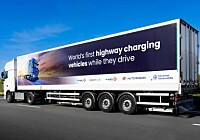Tests underway on French motorway into recharging electric vehicle as you drive
‘World-first’ scheme sees quicker charging times than traditional methods
Four vehicles are being tested on the 1.5 km stretch of road, including a goods lorry
Vinci
An innovative trial of a motorway that can charge electric vehicles whilst they are driving along it is underway in France, with the motorway operator behind it calling the scheme a ‘world-first’.
The ‘Charge as you drive’ (Chargez en roulant) project is headed by Vinci Autoroutes, and looks to revolutionise electric vehicle usage.
If trials are successful, it could see much of Europe’s road network adapted to charge electric vehicles, reducing the need for physical electric charging stations.
Reduces size and cost of batteries
First announced in 2023, works on a 1.5 km section of the A10 motorway to the south-west of Paris took place earlier this year.
This stretch of the motorway has seen hundreds of copper coils installed under the road surface. The coils can charge certain electric vehicles equipped with ‘receivers’ (récepteurs), as well as electric HGVs as they drive.
Four prototype vehicles (a HGV, bus, car, and a commercial véhicule utilitaire) are driving along the road to test its effectiveness.
“Deployed on a large scale, this solution would significantly reduce the size of vehicle batteries, thus improving the overall performance of heavy-duty electric mobility,” said Vinci in a press release.
Performance would be improved “both operationally (cheaper and lighter vehicles with improved fuel consumption and payload, elimination of charging downtime, etc.) and environmentally (reduced need for raw materials and the carbon footprint associated with battery manufacturing),” it added.
Success of trial, but high costs
The first results from the trial show that charging can reach up to 300 kw, and assume a steady rate of 200 kw.
This is quicker than the average current charging port, with the added benefit that cars remain in use whilst charging.
If these results were maintained widespread installation would reduce the need to use charging ports.
Several other countries including Sweden, Germany, and the United States are also testing similar road networks, but Vinci states they are the first to conduct live testing.
In Switzerland, a similar principle is being tested on the rail network for electric trains.
If the concept of charging roads becomes viable, much of the material used can be produced in Europe, reducing the need for imports.
The initial installation cost is estimated to be €1.5 million per kilometre of road.





























